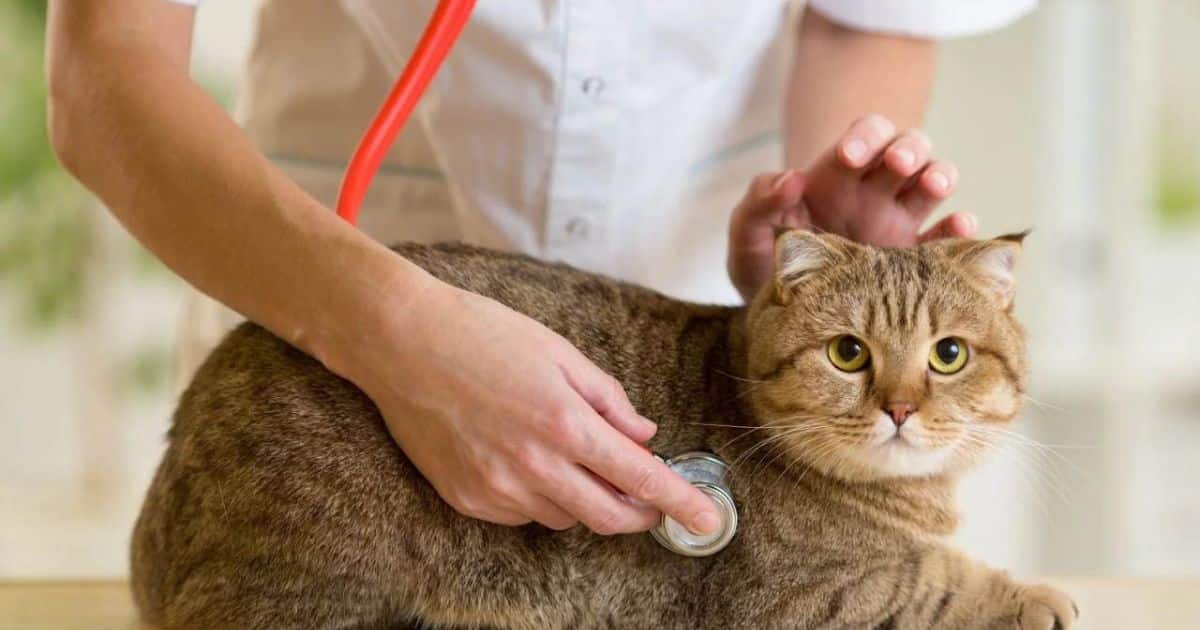If you’ve ever been jolted awake by the sound of your cat hacking and gagging in the middle of the night, you’re not alone. It’s a sound that can send shivers down any cat owner’s spine. But why exactly do cats gag, and when should you be concerned? Let’s dive into this feline mystery and uncover the reasons behind your cat’s gagging, what you can do about it, and when it’s time to call the vet.
Why Does My Cat Keep Gagging?
Cats gag for various reasons, ranging from the harmless to the potentially serious. Understanding these causes can help you better care for your feline friend and know when to seek professional help.
Expelling a Hairball
One of the most common reasons for cat gagging is the infamous hairball. These unpleasant little packages are a byproduct of your cat’s grooming habits. As cats lick their fur, they ingest loose hair, which can accumulate in their stomach. When enough hair builds up, your cat will attempt to expel it, resulting in that characteristic gagging sound.
Fun Fact: Long-haired cats are more prone to hairballs than their short-haired counterparts.
To help reduce hairballs:
- Brush your cat regularly to remove loose fur
- Provide a diet rich in fiber to help move hair through the digestive tract
- Consider hairball-specific cat foods or treats
MORE POST: Why Does My Cat Like To Be Held Like A Baby?
Trying to Remove Something From Their Throat
Cats are curious creatures, and sometimes this curiosity leads them to swallow things they shouldn’t. From rubber bands to small toys, foreign objects can get stuck in your cat’s throat, causing them to gag as they try to dislodge the item.
Common objects cats might swallow:
- String or yarn
- Small toy parts
- Bits of plastic
- Plant leaves
If you suspect your cat has swallowed something it shouldn’t, keep a close eye on them. If gagging persists or your cat shows signs of distress, it’s time for an immediate trip to the vet.
Overate or Ate Their Food Too Quickly
Some cats are enthusiastic eaters, gobbling down their food as if it’s their last meal. This rapid eating can lead to gagging or regurgitation. When cats eat too quickly, they may swallow air along with their food, leading to discomfort and potential gagging.
To slow down your speed-eater:
- Use puzzle feeders or slow-feed bowls
- Divide meals into smaller, more frequent portions
- Place a large, clean object (like a golf ball) in their bowl to eat around
Kidney Disease

As cats age, they become more susceptible to kidney disease, which can manifest in various ways, including gagging. The buildup of toxins that healthy kidneys would typically filter out can cause nausea and gagging in cats with kidney issues.
Other symptoms of kidney disease:
- Increased thirst and urination
- Weight loss
- Decreased appetite
- Lethargy
Regular check-ups are crucial, especially for older cats, to catch kidney problems early.
Asthma
Yes, cats can get asthma too! Feline asthma can cause inflammation and constriction of the airways, leading to coughing, wheezing, and gagging. This condition can be triggered by allergens in the environment, such as dust, pollen, or cigarette smoke.
Case Study: Mittens, a 7-year-old Siamese, started showing signs of gagging and wheezing. Her owner, Sarah, noticed these episodes were more frequent when she cleaned the house. After a vet visit and some tests, Mittens was diagnosed with feline asthma triggered by dust and cleaning products. With the right medication and some changes to Sarah’s cleaning routine, Mittens’ symptoms improved significantly.
Heart Disease
Heart problems in cats can sometimes lead to fluid accumulation in the lungs, causing coughing and gagging. This is more common in older cats but can affect cats of any age.
| Breeds More Prone to Heart Disease |
| Maine Coon |
| Ragdoll |
| Persian |
| Sphynx |
| American Shorthair |
If you have one of these breeds or an older cat, keep an eye out for signs of heart issues, including gagging, difficulty breathing, or reduced activity levels.
Liver Disease

The liver plays a crucial role in detoxifying the body, and when it’s not functioning properly, it can lead to a buildup of toxins. This accumulation can cause nausea and gagging in cats. Liver disease can be tricky to spot early on, which is why regular vet check-ups are so important.
Signs of liver trouble in cats:
- Jaundice (yellowing of the eyes, gums, or skin)
- Loss of appetite
- Weight loss
- Increased thirst and urination
- Vomiting or diarrhea
Respiratory Illness Due to Illness or Parasites
Upper respiratory infections, often caused by viruses or bacteria, can lead to excessive mucus production, coughing, and gagging in cats. Similarly, certain parasites, like lungworms, can irritate the respiratory tract and cause gagging.
Common respiratory infections in cats:
- Feline herpesvirus
- Feline calicivirus
- Bordetella bronchiseptica
- Chlamydophila felis
Upset Stomach or Nausea
Just like humans, cats can experience upset stomachs or nausea, which may lead to gagging. This can be caused by a variety of factors, including dietary changes, food allergies, or ingestion of something that didn’t agree with them.
“A cat’s digestive system is sensitive. Sudden changes in diet, even to high-quality foods, can upset their stomach and lead to gagging or vomiting.”
Dr. Sarah Feline, DVM
When Should I Worry About My Cat’s Gagging?
While occasional gagging, especially if followed by the production of a hairball, is generally not a cause for alarm, there are instances when gagging should be taken more seriously.
Red flags that indicate a need for immediate vet attention:
- Persistent gagging that doesn’t result in a hairball
- Gagging accompanied by difficulty breathing
- Blood in vomit or saliva
- Lethargy or loss of appetite
- Visible distress or pain
If your cat’s gagging is frequent (more than once or twice a week) or is accompanied by any of the above symptoms, it’s time to consult with your veterinarian.
How Can I Help My Gagging Cat at Home?

While serious cases require professional attention, there are some things you can do at home to help your gagging cat:
- Stay calm: Your cat can sense your anxiety, which might make them more stressed.
- Observe closely: Watch for any additional symptoms or if your cat produces a hairball.
- Remove potential hazards: If you suspect your cat has swallowed something, remove any similar objects from their reach.
- Offer water: After a gagging episode, your cat might appreciate some fresh water.
- Consider diet changes: If gagging is frequent, discuss potential dietary adjustments with your vet.
Home remedies for minor gagging issues:
- A teaspoon of plain canned pumpkin (not pie filling) can help with hairballs
- Specialized hairball control treats or gels
- Increased brushing to reduce loose fur ingestion
Remember, these are for minor issues only. Persistent or severe gagging always warrants a trip to the vet.
Preventing Gagging in Cats
Prevention is always better than cure. Here are some ways to reduce the likelihood of gagging in your feline friend:
- Regular grooming: Brush your cat frequently to reduce loose fur.
- Healthy diet: Provide a balanced, high-quality diet appropriate for your cat’s age and health status.
- Hydration: Ensure fresh water is always available.
- Safe environment: Keep small objects that could be swallowed out of reach.
- Regular check-ups: Annual vet visits can catch potential health issues early.
When to Consult Your Vet
While some causes of gagging are benign, others require professional attention. Don’t hesitate to consult your vet if:
- Gagging is frequent or persistent
- Your cat shows signs of distress or pain
- There are additional symptoms like weight loss, lethargy, or changes in appetite
- You’re unsure about the cause or severity of the gagging
During a vet visit for gagging, expect a thorough physical examination. Your vet may also recommend:
- Blood tests to check organ function
- X-rays or ultrasound to look for foreign objects or internal issues
- Specific tests for conditions like asthma or heart disease
Conclusion
Understanding why your cat is gagging and knowing when to be concerned is crucial for any cat owner. While occasional gagging, especially related to hairballs, is often normal, persistent or severe gagging can be a sign of more serious issues. By staying observant, providing good preventative care, and knowing when to seek professional help, you can ensure your feline friend stays happy and healthy.
Remember, you know your cat best. If something doesn’t seem right, trust your instincts and consult with your veterinarian. Your furry friend depends on you to be their advocate for good health!
ALSO READ THIS POST: Why Does My Cat Trill And Run Away?
FAQ’s
How to help a cat that is gagging?
Stay calm and observe your cat closely. If gagging persists, remove any potential hazards and offer fresh water. For frequent gagging or signs of distress, consult your vet promptly.
Why is my cat gagging but not throwing up?
This could be due to hairballs, asthma, or something stuck in the throat. It might also indicate nausea from various causes like kidney or liver issues. If it continues, a vet check is advisable.
Why is my cat gagging over and over?
Repeated gagging could signal respiratory issues, chronic hairballs, or more serious conditions like heart or kidney disease. It might also be due to allergies or ingestion of a foreign object. Persistent gagging warrants a vet visit.
Why does my cat keep acting like he’s going to throw up?
This behavior often indicates nausea, which can be caused by dietary issues, hairballs, or underlying health problems. It could also be a sign of acid reflux or an obstruction. Monitor closely and consult a vet if it continues.
What to do if cat keeps retching?
First, ensure there’s no immediate choking hazard. Monitor for other symptoms and try offering small amounts of water. If retching persists or is accompanied by lethargy or loss of appetite, seek veterinary care promptly.
Why does my cat make a weird noise like something stuck throat?
This sound could indicate a partial obstruction, respiratory infection, or feline asthma. It might also be due to hairballs or inflammation in the throat. If the noise persists or your cat shows distress, consult your vet.

Davin Connor is an experienced author with 3 years in pets writing. Known for concise, informative content, he shares expertise on pet care, behavior, and health through his engaging articles.






